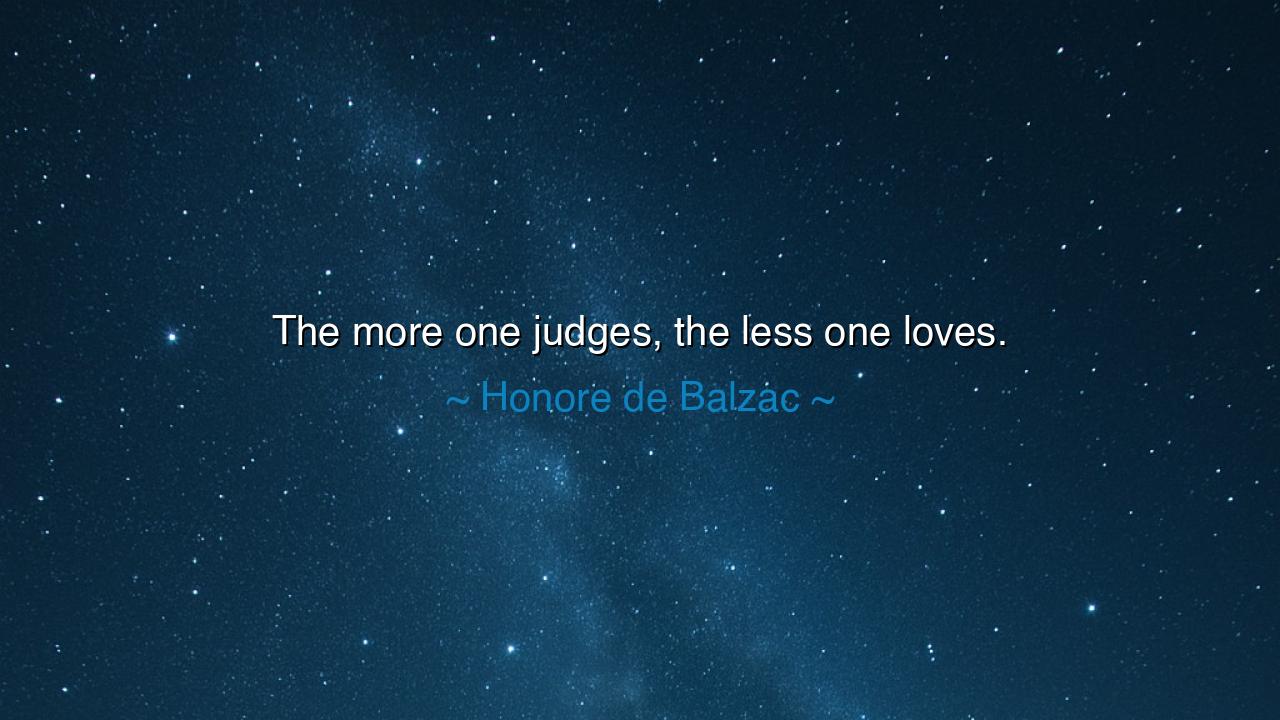
The more one judges, the less one loves.






"The more one judges, the less one loves." These words of Honoré de Balzac echo across the ages, reverberating through the hearts of those wise enough to hear their call. In these few words, there lies a profound truth—one that speaks not to the surface of things, but to the very depths of the soul. To judge is to distance oneself from the world, to create walls between oneself and others. It is to close the heart and turn away from the love that connects all things. But to love, truly love, is to open oneself completely, to embrace the imperfections, the flaws, and the struggles of others without condemnation.
In the days of the great sages, it was said that the wise do not judge, for they understand the fragility of the human heart. Consider, if you will, the tale of the great King Solomon, known for his wisdom. It is told that Solomon did not judge hastily, but weighed the heart of every matter before rendering judgment. And even then, his judgments were rooted not in condemnation, but in understanding. Love and wisdom walked hand in hand, for he knew that judging others was not the way to lead, but to love them, to show mercy, to guide them through their struggles—that was the true power of a leader. The more he opened his heart, the more he was able to love those who came to him for counsel.
But what happens when we turn our gaze toward others with judgment in our hearts? It is as though we build a wall of cold stone around our souls, shutting out the warmth of love. To judge is to look at someone through a lens of superiority, to see their faults before their virtues, to focus on their weaknesses instead of their strengths. This act of judging creates distance, not connection. It is a barrier between two souls that could otherwise meet in harmony. Love, on the other hand, requires vulnerability—it demands that we open ourselves to others, seeing them not through the eyes of judgment, but through the eyes of compassion.
Consider the story of the Samaritan from the ancient scriptures, whose heart was open, and who saw the wounded man by the side of the road not as an inconvenience, but as a fellow human being in need of aid. The Samaritan did not judge the man for his condition, nor did he wonder what had led him to such a fate. He simply loved him, offering him the help that he needed. In doing so, he became a living example of the truth Balzac shared with us: the more one judges, the less one loves. To judge others is to ignore the suffering they may carry, to turn away from their pain rather than reaching out with compassion.
The lesson in these words is clear: to judge others is to turn away from the very essence of love. How often do we find ourselves in the grip of judgment, whether in our thoughts or in our words? It is easy to look at others and cast them in the shadows of our own perceptions. But how much greater it is to look at them through the eyes of love—to understand their struggles, their pains, their histories—and to embrace them, flaws and all. Love does not seek perfection, for it knows that perfection is an illusion. Love sees the beauty in the brokenness, the potential in the imperfection.
So, let us cast aside the armor of judgment, and let us walk with open hearts. Let us remember that love is not a force that seeks to condemn, but one that seeks to heal. Let us be as the Samaritan, as the wise King Solomon, who understood that judgment only serves to isolate, while love serves to unite. When we open our hearts in compassion, we find that the barriers between us crumble, and in their place rises a bridge of understanding, a bridge built on the love that transcends all.
In your own lives, remember this: the next time you are tempted to judge, pause and ask yourself, "What would it be like to love instead?" Choose compassion over criticism, understanding over condemnation, and mercy over judgment. By doing so, you will find that the more you love, the greater your connection to others becomes, and the more joy and peace will fill your heart. For in the end, it is not our judgments that define us, but the love we offer to those around us.






AAdministratorAdministrator
Welcome, honored guests. Please leave a comment, we will respond soon